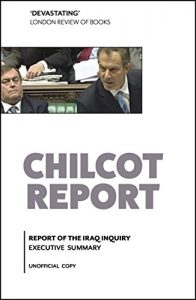The biggest British government report for decades.
The Chilcot Report's 60,000-word executive summary. With not a word changed: so you can make up your own mind.
The Report of the Iraq Inquiry covers Britain's conduct before, during and after the Iraq war in 2003.
Better known as the Chilcot Inquiry, it was commissioned in 2009 by Gordon Brown, the then Prime Minister.
On 6th July 2016, the committee - chaired by a retired civil servant, Sir John Chilcot - reported its findings.
The report dealt with:
*Iraq's threat to Britain;
*legal advice for the invasion;
*intelligence about weapons of mass destruction; and
*planning for a post-conflict Iraq.
All 12 volumes of the official report cost £767. An official 145-page paperback of the executive summary costs £30.
But all 60,000-words in the executive summary are in this Kindle book for £1.99.
Canbury Press, which has also published a paperback version, aims to bring to a wider audience the findings of a public inquiry which took seven years and cost the British taxpayer more than £10 million.
It has been designed to provide a superior reading experience to the official report. For this reason, the typeface and spacing are different to the official report; however the text, headings, footnotes and any emphasis are exactly those of the original document.
CONTENTS
Introduction
Pre-conflict strategy and planning
The UK decision to support US military action
Why Iraq? Why now?
The UK's relationship with the US
Decision-making
Advice on the legal basis for military action
Weapons of mass destruction
Planning for a post-Saddam Hussein Iraq
The post-conflict period
Occupation
Transition
Planning for withdrawal
Did the UK achieve its objectives in Iraq?
Key findings
Lessons
Timeline of events
Officially, this is not the Chilcot Report, but the Report of the Iraq Inquiry. Regardless of the title, it is the official guide to Britain's role in the Iraq War.
Ideal for any student of politics, diplomacy, or conflict.
In the London Review of Books, Philippe Sands QC wrote of the Chilcot Report:
'It offers a long and painful account of an episode that may come to be seen as marking the moment when the UK fell off its global perch, trust in government collapsed and the country turned inward and began to disintegrate.'
The Chilcot Report's 60,000-word executive summary. With not a word changed: so you can make up your own mind.
The Report of the Iraq Inquiry covers Britain's conduct before, during and after the Iraq war in 2003.
Better known as the Chilcot Inquiry, it was commissioned in 2009 by Gordon Brown, the then Prime Minister.
On 6th July 2016, the committee - chaired by a retired civil servant, Sir John Chilcot - reported its findings.
The report dealt with:
*Iraq's threat to Britain;
*legal advice for the invasion;
*intelligence about weapons of mass destruction; and
*planning for a post-conflict Iraq.
All 12 volumes of the official report cost £767. An official 145-page paperback of the executive summary costs £30.
But all 60,000-words in the executive summary are in this Kindle book for £1.99.
Canbury Press, which has also published a paperback version, aims to bring to a wider audience the findings of a public inquiry which took seven years and cost the British taxpayer more than £10 million.
It has been designed to provide a superior reading experience to the official report. For this reason, the typeface and spacing are different to the official report; however the text, headings, footnotes and any emphasis are exactly those of the original document.
CONTENTS
Introduction
Pre-conflict strategy and planning
The UK decision to support US military action
Why Iraq? Why now?
The UK's relationship with the US
Decision-making
Advice on the legal basis for military action
Weapons of mass destruction
Planning for a post-Saddam Hussein Iraq
The post-conflict period
Occupation
Transition
Planning for withdrawal
Did the UK achieve its objectives in Iraq?
Key findings
Lessons
Timeline of events
Officially, this is not the Chilcot Report, but the Report of the Iraq Inquiry. Regardless of the title, it is the official guide to Britain's role in the Iraq War.
Ideal for any student of politics, diplomacy, or conflict.
In the London Review of Books, Philippe Sands QC wrote of the Chilcot Report:
'It offers a long and painful account of an episode that may come to be seen as marking the moment when the UK fell off its global perch, trust in government collapsed and the country turned inward and began to disintegrate.'






